The Sound and the Fury Blu-ray Movie
HomeThe Sound and the Fury Blu-ray Movie 
Limited Edition to 3000 - SOLD OUTTwilight Time | 1959 | 110 min | Not rated | Sep 11, 2012
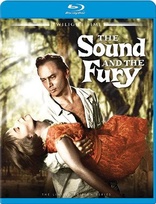
Movie rating
6.4 | / 10 |
Blu-ray rating
| Users | 0.0 | |
| Reviewer | 3.5 | |
| Overall | 3.5 |
Overview
The Sound and the Fury (1959)
This movie follows the lives and passions of the Compsons: a once-proud Southern family now just barely scraping by both financially and emotionally. Howard passes the time in a bottle; his brother Bengy is child in a man's body; sister Caddy has come crawling home after years of being kept by a string of "admirers." Only Jason, the cruel, cold-hearted adopted head of the family, and Quentin, who was abandoned at birth by Caddy, have the fire and the fury needed to put the family back on its feet again.
Starring: Yul Brynner, Joanne Woodward, Stuart Whitman, Jack Warden, John Beal (I)Director: Martin Ritt
| Drama | 100% |
Specifications
Video
Video codec: MPEG-4 AVC
Video resolution: 1080p
Aspect ratio: 2.37:1
Original aspect ratio: 2.35:1
Audio
English: DTS-HD Master Audio 2.0
Music: DTS-HD Master Audio 2.0
Subtitles
None
Discs
25GB Blu-ray Disc
Single disc (1 BD)
Playback
Region free
Review
Rating summary
| Movie | 3.0 | |
| Video | 4.0 | |
| Audio | 3.5 | |
| Extras | 2.0 | |
| Overall | 3.5 |
The Sound and the Fury Blu-ray Movie Review
. . .signifying William Faulkner left by the wayside.
Reviewed by Jeffrey Kauffman September 5, 2012Anyone who has had a personal encounter with the extremely unique writing style of William Faulkner can probably remember first running up against the author’s run on sentences, disjointed narrative approach and stream of consciousness musings. My own introduction to Faulkner’s novels came courtesy of my high school Honors English teacher, who handed us all paperback copies of Intruder in the Dust right before Christmas vacation one year and told us to make it through the first 50 or so pages by the time school reconvened after the new year. That seemed like an absurdly easy assignment, at least until one actually opened the book. I don’t remember the specifics (I may in fact have shut the memories out due to post traumatic stress disorder), but it seems like the first sentence of the novel went on for pages and I was, in a word, gobsmacked. I repeatedly had to go over individual phrases in order to glean some semblance of meaning. Somewhere along the way, though, either through attrition or some newly acquired sense I acquired, the book actually started to be (largely) comprehensible. But the very peculiarities which have always set Faulkner apart from his American writing kin point up the single most salient question when it comes to adapting the author’s novel to the medium of film: is it even possible to transfer Faulkner’s incredibly individual voice and style to cinema? Based on the pretty sporadic record so far, the answer would seem to be an iffy “maybe” at very best. Faulkner himself tried somewhat unsuccessfully to matriculate to the movie business, contributing a number of interesting screenplays through the years, with film as disparate as To Have and Have Not, The Big Sleep and Land of the Pharoahs, but it’s notable that Faulkner never attempted to adapt one of his own works for the screen, perhaps sensing that it was a formidable, perhaps impossible, task.
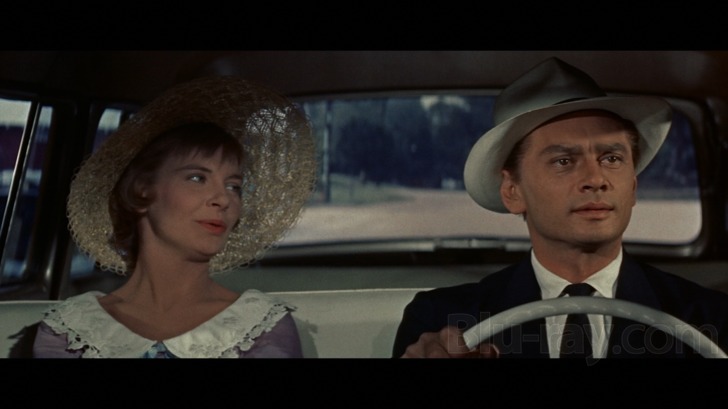
As is the case with several film adaptations of Faulkner’s unwieldy source material, The Sound and the Fury has been sliced and diced to the point where it barely resembles the original novel. While the torpor that informed Faulkner’s story remains largely intact, the novel’s multifaceted points of view and intergenerational timelines are barely hinted it. Instead this becomes a rather weird amalgamation of several films which had made an impact in the fifties, including East of Eden, Picnic and director Martin Ritt’s own The Long Hot Summer, itself a perhaps more successful adaptation of Faulkner’s writing. The Sound and the Fury recounts the dysfunctions of the Compson family, focusing on teenager Quentin (Joanne Woodward, almost 30 at the time and not the most convincing teen in the world). Quentin was abandoned by her mother at childbirth and is an unhappy girl looking for love in all the wrong places. She’s surrounded by a typically Southern Gothic assortment of relatives (or near relatives), including step-Uncle Jason (Yul Brynner), who has taken over the reigns of the family, and two “real” Uncles, Ben (Jack Warden), a mute who is mentally deficient and Howard (John Beal), a drunk who basically sits on the porch in a stupor for much of the film. Jason’s mother Caroline (Françoise Rosay), who married the Compson paterfamilias after his first wife died, is a wannabe aristocrat who barks orders to the family maid (Ethel Waters) from an upstairs bedroom. And then into all this turmoil walks Caddy (Margaret Leighton), Quentin’s long lost mother.
Ritt was a director who obviously had an affinity for the South, as witnessed not just by his two Faulkner adaptations, but by more contemporary fare like the wonderful Sounder and even Norma Rae. Here, helped by some very effective production design, he captures the frayed splendor of the Compson estate. Notice the filthy front door of the mansion and the ragged carpeting lining the impressive Georgian stairs and balustrade in the mansion’s foyer. Behind the steps hang curtains which have obviously seen much better days (or in fact years or decades). The entire film is infused with this sort of decay and even degradation, and it makes it hard to find a suitably sympathetic character to root for at times. Quentin is obviously supposed to be the viewers’ “foot in the door”, so to speak, but even she has questionable elements, and once she begins to see Jason as something more than merely her step-Uncle, the implied subtext of quasi-incest makes The Sound and the Fury a decidedly iffy proposition for those with an old fashioned moral sense.
The biggest problem with The Sound and the Fury, though, is in its casting decisions, including the almost inexplicable choice of Brynner as Jason. The character has been rethought here to take Brynner’s rather heavy accent into account, but even given that revisioning, Brynner simply is too one dimensional for a role that definitely requires some nuance. Some of his interactions with Woodward are in fact quite wonderful (like when he stuffs a handkerchief into her mouth and boots her out the car door informing her that “knowledge is power”), there’s just a dissociative quality about his performance at times that is not in a typically florid Faulknerian tone. Woodward is excellent, if obviously too old to play the teenage Quentin. She’s spunky but vulnerable, and her slouching, swaying walk is at once seductive yet lethargic. Stuart Whitman shows up as a hunky carnival worker who briefly captures Quentin’s interest and he manages to invest the film with some romantic sparks and athletic allure. Margaret Leighton is probably the best overall thing about this film, though again scenarist Harriet Frank, Jr. and Irving Ravetch have some completely altered Caddy’s character that Faulkner purists are going to be wondering who exactly this washed up old hag really is. (It's interesting that Ritt or producer Jerry Wald simply didn't go to Vivien Leigh for this role, for this conception of Caddy is clearly modeled on characters like Blanche Du Bois, albeit in this case in semi-sparkling Deluxe Color and depending not on the kindness of strangers, but long estranged family members.)
There’s simply no way that The Sound and the Fury could have been digested down into a format suitable for a feature film and still be able to retain some semblance of the novel’s original collection of different narratives (and narrators), and so some of the changes the film made to the novel are understandable, at least on a certain level. But the overriding sense of dissolution and moral turpitude that fills virtually every nook and cranny of the film makes this an odd piece of “entertainment”, to say the least. It’s probably best appreciated as yet another odd entry in the Faulkner adaptation canon, highlighted by some interesting supporting performances but thrown for a loop by the odd addition of Brynner.
The Sound and the Fury Blu-ray Movie, Video Quality 

The Sound and the Fury is presented on Blu-ray courtesy of Twilight Time with an AVC encoded 1080p transfer in 2.37:1. The film has not been readily available on home video before, and this is the first time this CinemaScope feature has been presented in its original aspect ratio (more or less). Charles G. Clarke's workmanlike cinematography nicely captures the decaying ambience of Faulkner's south, and while this Fox catalog title may not have the absolutely crystalline sharpness of some of the other 'Scope titles Twilight Time has licensed, for the most part here things look very good indeed. Color is generally accurate and decently saturated, if flesh tones seem just slightly on the brown-yellow side of things some of the time. Contrast and black levels are excellent, and the image retains good sharpness and clarity (occasionally there are some inherent focus problems at the very edge of the frame). A couple of brief shots have some odd stability issues (note the very minor if noticeable wobble in the dinner scene with Woodward and Brynner at around 48 minutes into the film, which is clearly not an issue of camera movement). There is some persistent if very negligible ringing quite noticeable in a number of exterior shots (is that Universal's famed "town square" on display?). It's most noticeable when there are trees against a background of clear blue sky.
The Sound and the Fury Blu-ray Movie, Audio Quality 
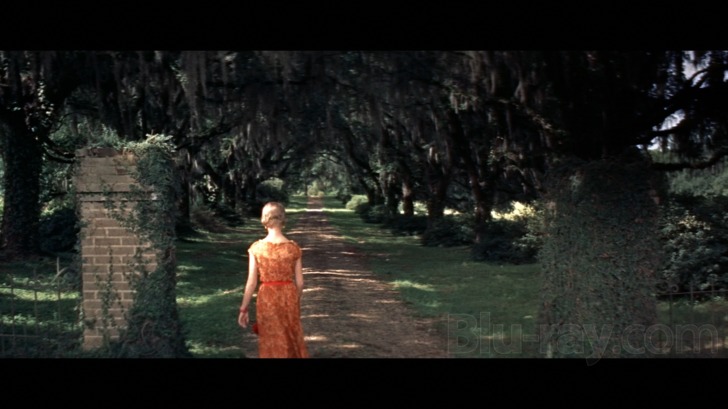
One of the best things about The Sound and the Fury is yet another fabulous score by the inimitable Alex North, and that is probably the best thing about this Blu-ray's lossless DTS-HD Master Audio mix (presented via DTS-HD Master Audio 2.0). North invests his score with lurching, propulsive brass accented cues and those burst forth from the speakers with excellent fidelity, though there is occasional very slight boxiness in the midrange (something that is absent from the actual isolated music score). That same occasional minor boxiness is much more apparent in the dialogue, which has an odd artificial quality at times, as if it's being radioed in from a distant location. Generally speaking, though, fidelity is very good, with dialogue cleanly presented (if at times hard to understand due to some heavy accents). Dynamic range is mostly limited to North's amazing music.
The Sound and the Fury Blu-ray Movie, Special Features and Extras 
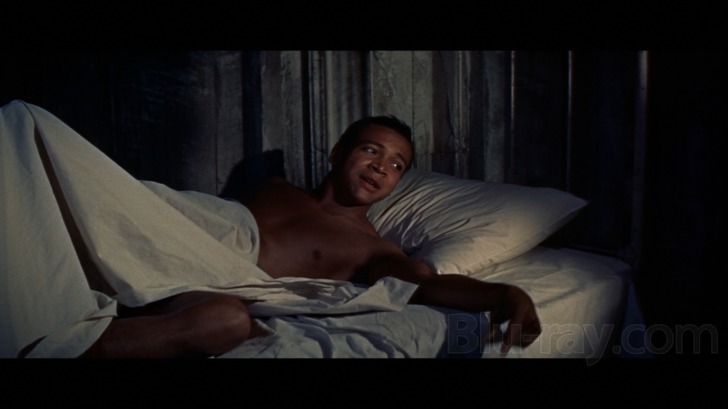
- Isolated Score, a Twilight Time hallmark, offers up Alex North's sumptuous work in DTS-HD Master Audio 2.0. This strangely underappreciated piece is yet another sterling example of North's effortless blend of jazz and classical motifs. Though this supplement may appeal to a rather narrow range of potential consumers, for me personally it makes this film a must have.
The Sound and the Fury Blu-ray Movie, Overall Score and Recommendation 
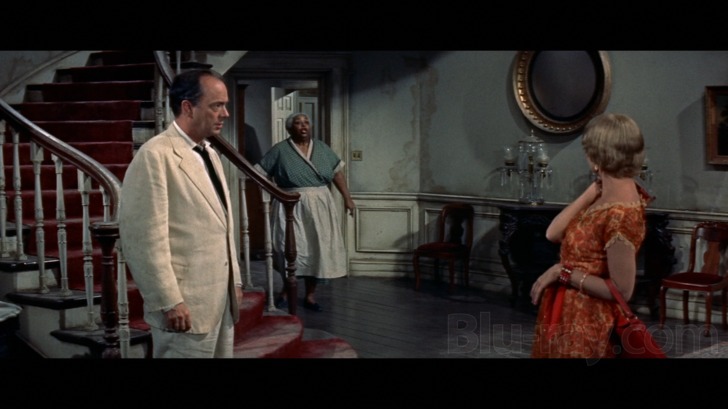
Probably the best way to enjoy (if that's even an appropriate word) The Sound and the Fury is to either not read the Faulkner source novel first or, if you already have, firmly divorce the adaptation from its original form. So many changes large and small have been made to this piece that it retains little of Faulkner's original conception, even if it does in fact manage to capture at least a hint of Faulkner's incomparable voice and style. At least a couple of the casting decisions here are questionable at best, but the film has an interesting array of character actors who are at the very least colorful if (again) not exactly Faulknerian in conception. This film is a mixed bag—Faulkner purists are going to balk, but those who go in for overheated Southern Gothic melodrama may well end up liking, if not loving, it. The film does have one undisputed element of mastery, and that is the unmatched Alex North score, which is presented here on an isolated track that fully reveals its complexity and evocative qualities.
Similar titles
Similar titles you might also like

Fish Tank
2009

Ordinary People
Paramount Presents #30
1980

Hamlet
1948

Wonder Wheel
2017

Is Anybody There?
2008

The Entertainer
1960

Touchy Feely
2013

The Wild One
1953

The Private Lives of Pippa Lee
2009

360
2011

Nebraska
2013

Imaginary Crimes
1994

Nil by Mouth
1997

Kes
1969

Succession: The Complete Series
2018-2023

Heaven Knows What
2014

The Descendants
2011

The Story of Temple Drake
1933

The Fabelmans 4K
2022

Jolene
2008